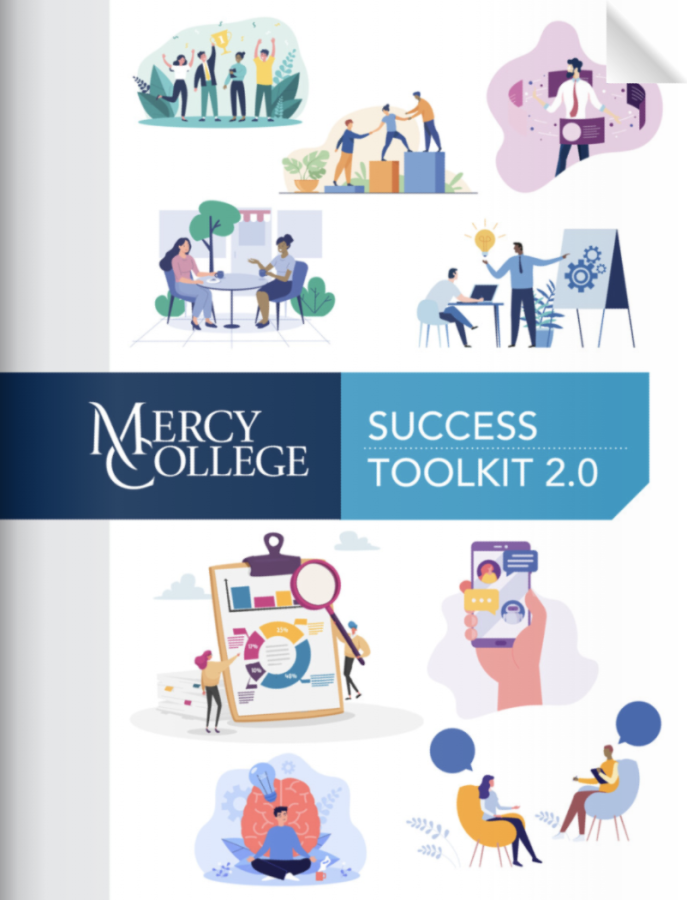Success Toolkit 2.0 Will Replace Previous Toolkit
Mercy College has recently launched the Success Toolkit 2.0. According to President Tim Hall, the project will be more inclusive with more representation from faculty, and students will see the continued improvement of proactive support done with the Personalized Achievement Contract (PACT) mentorship.
“How do we make sure that success is inclusive? It includes everybody we can. We will never, so far as I can understand, be able to include everybody, but we can include more people than we have in the past. And that’s what we are trying to do,” said Hall.
The Toolkit 2.0 is a reset from the previous Toolkit launched in 2015, according to Jodi Hoellger, the Assistant Director of College Communications at Mercy. The Toolkit 2.0 was asserted with new “evidence-based” practices based on seven years of data that launched this year, and which will be implemented over the next several years.
The Success Toolkit serves as a supportive and proactive tool for students dealing with multiple issues, including academic and financial. Hall says Mercy has partnered with faculty to use them as an intelligence gatherer, this way they can help students before they start failing.
“One time, a PACT member asked a student why they weren’t attending, and the student said, ‘Well, I lost my MetroCard, and I don’t have the money to buy a MetroCard,’ so our PACT program gets them a MetroCard to get them back into class. That’s the way being proactive works,” said Hall.
According to Hoellger, the college’s signature (PACT) mentoring program that started in 2008 focuses on improving retention and graduation rates by offering one-on-one with a mentor to assist with academics, financial aid, and career preparedness throughout college. The budget for PACT is estimated at around $3 to $4 million a year.
In 2006, Mercy displayed equity gaps. The year-to-year retention rate for black students trailed that of white students by almost 20 percentage points, and a white student who enrolled in 2010 was more than twice as likely to graduate in four years than a Latino student, stated in the Success Toolkit 2.0.
The graduation rate for Black students improved by 24 percentage points over the last eight years, whereas Hispanic graduation rates improved by 19 percentage points over the same time frame, according to the data provided by Hoellger.
Hall enforced the importance of continuing to increase students’ success rate, not only during their first year but throughout all years leading to graduation. When it comes to student success, he says the factors measured are retention and graduation.
“Colleges want students to enroll, but Mercy wants students not to just enroll. We want them to get to the finish line,” said Hall.
A study by Education Data.Org showed that In the United States, the overall dropout rate for undergraduate college students is 40 percent, and the rate of students that drop out after their first year of college is 30 percent. Most of the dropout students stated financial problems to be the reason.
“I don’t think people understand how many students drop out before they get through, and I’m absolutely convinced that a good deal of the dropout problem is not with students, but it’s with us, it’s the way we (colleges) do things. It is frequently the way colleges have done things for years, so they just keep on doing that, convinced that well if it doesn’t work for everybody, too bad,” said Hall.
The Federal Government measures the success rate of students by keeping track of those who graduate within six years. Hall said Mercy keeps track of the six-year graduation rate, but Mercy also finds it important to keep track of students who make it from the first year to the second year of college. The data also accounts for students’ race and family income.
Over the past year, Mercy has been awarded federal funding from the American Rescue Plan (ARP) (HEERF II) and (HEERF III), according to Hoellger, Mercy received $11.5 in federal funding allocated for student aid. As of March 2022, Mercy has distributed this aid to 9,136 students in the form of financial awards.
Mercy also distributed more than $37,000 in aid through a Student Emergency Fund to help students and has provided 20,154 meals to 1,240 members of our community through the Maverick Market food pantry, which supports students experiencing food insecurity.
Hall reflected, “I believe that Mercy students are the hope and future of America, and it’s my responsibility to work with our faculty and all of our other staff to help them to the extent we can, and be the success that they’re capable of being.”

Nicole Alarcon is a senior at Mercy College, majoring in journalism. Born in São Paulo, Brazil, she moved to the United States at 10-years-old.
Nicole...








